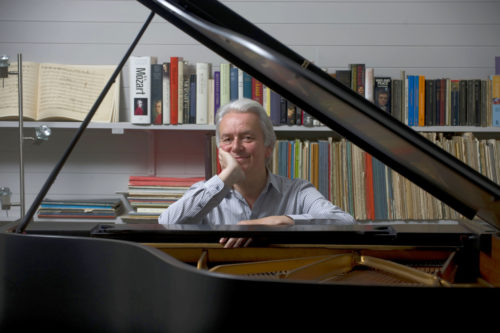 United Kingdom Mozart: Christian Blackshaw (piano). Wigmore Hall, London, 27.1.2020. (JB)
United Kingdom Mozart: Christian Blackshaw (piano). Wigmore Hall, London, 27.1.2020. (JB)

Mozart – Piano Sonata in C K279; Piano Sonata in G K283; Piano Sonata in D K311; Piano Sonata in F K332; Piano Sonata in A minor K310
Mozart is the most transparent of all composers; so transparent that it’s easy to miss him. To interpret Mozart is to destroy him. The music calls for a sleight of mind – an invitation given by the pianist to listen to the composer rather than the pianist. It’s a very risky balance to pull off. And it varies with the same performer at every concert. This is music which is of the moment and no other moment: otherwise you’ve missed it. Rubinstein said in a famous television interview with Bernard Levin that he never knew what he was going to play until he’d played it. He then added that if he could collect up all the wrong notes there would enough of them to give another recital. But every schoolchild knows that some people’s wrong notes are more interesting than other people’s right ones. In the moment and of the moment is the way to deliver Mozart, and his music will tolerate no other approach.
Benjamin Britten and Clifford Curzon are the pianists who have most consistently taken me into Mozart’s very soul. Christian Blackshaw has shown in this recital that he is making a bid to stand alongside them. A huge challenge. And one he largely meets. For interest, this is the first in a sequence of recitials Blackshaw will give celebrating Mozart’s birthday over the next four years.
There is a tendency to see these sonatas as inferior Mozart among many critics. Blackshaw thinks they are wrong. So do I, for possibly different reasons. I would never want to play recitals of all the Beethoven sonatas he has said in a Wigmore podcast. But nor does he – wisely in my view – choose to play the Mozart sonatas in chronological order. He has many questions to grapple with, not least the modern Steinway on which he was playing. His answers to this last question were perhaps the most interesting part of the concert.
The brisk attack of the K279 in C was shocking: something like a bank-manager on a bad day. We don’t like being told we’re overdrawn. But the finger dexterity was dazzling; rhythmically impeccable and of the moment. And varied in dynamics which only a Steinway grand could provide. What would Mozart have done with this instrument? Blackshaw’s answers are life-enhancing.
I had better add that this did not work for everyone in the hall. A friend who had come with me said he had reluctantly decided that he didn’t relate to Mozart. That is because you have never heard it perceived in this way, I replied. The same friend was won over by the architectural drama which Blackshaw took us through in the great A minor sonata. There were moments here where the ghost of Liszt was heard in the unfolding, where the ear is seduced into remembering what has just gone and what is coming. A thrilling play with time in a profound aural challenge.
Christian Blackshaw had asked that (with the exception of the legally necessary emergency lighting) the hall be blacked out (no pun intended) so that audience attention and focus would be a hundred percent aural. The pianist was only visible as an outline.
Repeated notes present a problem to many pianists. Not for this pianist. He uses them as a springboard to bounce forward. When the hammer reaches the string it bounces forward immediately, a staccato which is not a staccato because its thrust is always forward. Steinway helps with this technique. (Bechstein is even better.)
Like all Mozart lovers, Blackshaw recognises that the composer’s thinking is always operatic, in whichever structure he is working. There were memorable lyrical moments, especially in the Adagio of K332 and again in the Andante cantabile of the great A minor.
Drama and lyricism again alternated in the encore of the D minor Fantasia K397, whose turbulent chromaticism took Mozart and us into the world of romanticism which only properly arrived with later composers. A classical composer speaking romanticism. Chromaticism is when a note is immediately contradicted by its nearest note and Blackshaw invokes the prophetic interchange of tonalities which would have been a surprise even coming from Schubert. The passages which are essentially cadenzas were a little hurried and missing a meditative touch, for my taste. But who am I to gently chastise Christian Blackshaw? This pianist also manages to deliver on the freshness which comes from an in-and-of-the-moment performance. The profound sadness of the Adagio will live for ever in the mind’s ear for all who were lucky enough to hear it.
Jack Buckley
For more about Christian Blackshaw click here.
